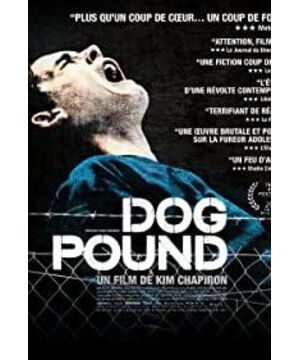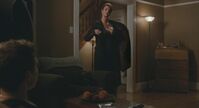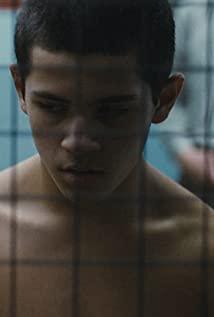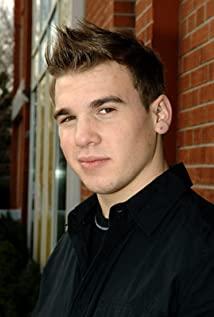The dynamic HIPHOP in the title is joyful and funny. And this "Dog Pound" tells a tragic story.
The first function of the prison is punitive, restricting the freedom of criminals and making you pay the corresponding price after committing crimes. Another function of the prison is to reform criminals, so that you will not harm the society after you go out. The DOG POUND here is a juvenile detention center. Through such a title, the director implies to the audience that the teenagers here are not restful and are "DOG" who will bite.
The gloomy environment at the beginning and the violent body language of juveniles set us the tone of violence in the whole film. Juveniles with 3 identities and different charges were assigned to the same juvenile detention center. Tall Bucther (we notice the character and actor have the same name) is the most violent, blinding the instructor due to dissatisfaction with the instructor's physical injury, which also implies Buchter's criminal behavior before. The drug dealer Davis looks glib and a little bit "mother", and the plot behind it also confirms this. Little Angel wasn't an angel like his name, although he looked younger and was charged with robbery.
It was these three teenagers who were assigned to this DOG POUND on the same day. The audience can't help but speculate that something must happen between them. Maybe DOG POUND is a gang formed by these three teenagers in prison? Butcher is the number one thug, Davis controls the flow of materials and financial power, and the little Angel is careful and ruthless, but he is actually their boss.
The truth is not like the prison growth movie "The Prophet," which is brutal. He was deliberately poured soup on his hands when he was eating, his new shoes were stolen, he was beaten inexplicably at night when he was sleeping, and he was even poisoned with malicious intent. This is what happened to Butcher and Davis. It was the eldest of teenagers, Banks, who imposed these on them. The main highlight of the first half of the film is the contradiction between them. Angel didn't suffer much at this time, but was locked up by the prison guards for talking back because the bed was not made.
Regarding this Banks, it can be understood as a kind of prisoner who is mixed with the "upper class" in the prison. This kind of person is close to the prison guards, and at the same time oppresses the prisoners who are not pleasing to their eyes. They form gangs and can be lawless even in places like prisons. Many prison movies have such people. Dogs fight with people, and they can be perfectly described in some respects.
And as the plot progressed, when the female teacher taught the children and told them not to take revenge, I couldn't help but wonder if there could be another explanation for this? Was Banks actually assigned by the warden to bully these two people on purpose? Watch him do violence to the violent Butcher and poison the drug dealer Davis. It is to provoke their anger and get them to take revenge on themselves. Compensation is all kinds of privileges. Someone earlier told Butcher to "don't get revenge on Banks, you'll get their game", and Banks himself said that it was the third time he came to the juvenile detention center, which is just the confirmation of this inference.
Leave Banks alone, because Butcher has given him what he deserves. At the same time that Butcher taught Banks a lesson, he also got a temporary position. He had a few sidekicks, and he also had the opportunity to sell drugs. When he went to bed at night, Davis could also use his lewd affair to make the atmosphere very good. easy.
At this point, the film entered its final climax. The little Angel (this doll is too tragic), who was thrown to death by the police officer because of the naked woman painted on the wall, caused a riot among the juvenile delinquents. At the same time, two of Banks' henchmen brutally sodomized Davis. Davis, who was very vulnerable, sought Butcher's help, but the latter couldn't forgive him because of Angel's affairs. At the most painful time, he sought help from the police, but was also rejected. These led to Davis' tragic suicide.
DEAD, DEAD, DEAD! The hunger strike finally triggered the biggest prison riot. At the end of the film, juvenile offenders and prison guards, or the biggest contradiction in society, were directly shown. No one really wanted to help them, no one cared about their lives or deaths. Everything is based on a strict hierarchy, and the indifference of human nature and selfishness have destroyed the bodies and minds of teenagers. When tear gas filled the cafeteria, it actually covered the bright lives of these teenagers.
Why didn't Max escape in the end? Because he knew he couldn't escape. You escape from DOG POUND, you will face the next CAT POUND, PIG POUND. Society is not open to you anymore. circus? Butcher's little wish was only a mocking hum.
So when Butcher clutched his broken leg and howled and was dragged back to DOG POUND, the film ended, and his life was no longer a circus, but a road of no return.
Who let the dogs out? Of course, you have to make them human first.
A detail flaw in the film
The cause of Davis's death is very questionable. When he died, the quilt was covered in blood, which is totally unreasonable. The previous episode has already shown how strict the inspection in the juvenile detention center is. There is absolutely no point in him. Because of so much blood, he didn't need to put a lot of effort into getting someone to give him a weapon to commit suicide, and it was impossible for him to do it with the emotions at that time.
The most likely cause of his death was the rupture of the rectum caused by sodomy and hemorrhage, but his expression was not so painful when he was eating in the cafeteria, just helpless. So how did the blood on his quilt appear?











